It would have been so easy for Tim Burton to let Michael Keaton dominate a Beetlejuice sequel. Despite having minimal screen time in the original 1988 movie, Keaton’s Betelgeuse was easily the most entertaining character the deceased Barbara and Adam Maitland encountered in the afterlife. A black-and-white-striped trickster who, for all his chaotic antics terrorizing the Deetz family and wanting to marry teenage Lydia, you couldn’t help but love and want more of him. So much so that the Beetlejuice animated series accommodated this by rewriting his and Lydia’s relationship from a demonic creep to her best friend.
Instead, Beetlejuice Beetlejuice smartly keeps the Ghost with the Most’s appearances to small but effective bursts yet again, giving the rest of its cast and world-building room to breathe. As a sequel, it comes close to matching Beetlejuice’s creepy fun factor, even if the story ties itself up in one too many subplots. But after years of underwhelming theatrical releases, Beetlejuice Beetlejuice also feels like Burton’s return to form post-Wednesday, even bridging these eras by casting Wednesday Addams herself, Jenna Ortega, as Lydia’s teenage daughter.
For adult Lydia (Winona Ryder), her obsession with the strange and unusual hasn’t wavered. She even made it her career, hosting a moderately successful paranormal TV show. But a lot has happened in 36 years. Lydia’s dating the show’s producer, Rory (Justin Theroux), whose blend of sleaze and neediness is on display for everyone to see. Her environmental activist/paranormal disbelieving child, Astrid (Ortega), resents Lydia’s obsession with the show and ghosts over family. (Conveniently, Lydia’s ability to see the dead fails to include Astrid’s late father.) And lingering trauma over Betelgeuse hasn’t gone away, with the entity—who hasn’t gotten over his obsession with Lydia—continuing his bio-exorcist business with the aid of several shrunken head workers.
Several pieces then fall into place to reunite goth and ghoul. Lydia learns from her artist stepmom, Delia (Catherine O’Hara), that her father has died—the cause revealed via some morbid stop-motion to write Jeffrey Jones and his real-life scandals out of the picture—prompting a return to Winter River, Connecticut, for his funeral at the old ghost home. On the flip side, a freak Netherworld accident revives Betelgeuse’s soul-sucking ex-wife Dolores (Monica Bellucci), who literally reassembles her body’s pieces before going on the hunt for her man. Dolores’s murder spree also catches the attention of cop actor-turned-afterlife cop Wolf Jackson (Willem Dafoe), a ghost who hilariously believes one profession makes him good at the other with mixed results. And yes, Lydia and Astrid have to work out their mother-daughter problems through a Halloween date, underworld trips, and an obligatory dance number.
Thankfully, Beetlejuice Beetlejuice isn’t as reliant on nostalgia as other legacyquels, even if Burton can’t help but include throwbacks like the “Day-O” song and the Netherworld waiting room. But the sequel’s biggest issue comes from its awkward attempt to make everything harmonize. There are a ton of subplots at play that, until the final act, feel rather detached, jumping from real world to Netherworld to a Betelgeuse shenanigan, and too many supporting characters are off doing their own creepy/funny thing while the Deetz family sorts out their grief above, those those “things” are entertaining to watch.
Ryder, Ortega, and O’Hara all strike the right balance of dramatic and funny (the latter generates the most laughs by a mile), while Keaton miraculously slips back into his character’s self-absorbent, gothic Looney Tunes behavior like no time has passed. You enjoy watching these characters play off each other, which makes the back half’s twists, once everyone heads to the Netherworld, all the more engaging.
The afterlife is where Burton’s “juice” is at its most invigorated. Everything feels enhanced while retaining that 1980s retro charm: stop-motion sandworms, stylized corridors, and bizarre weapons sticking out of corpses while they perform mundane activities. He even includes scenes that expand upon the world’s lore, such as an immigration line for the dead or a Soul Train that takes you to the afterlife in gloriously ’70s fashion. All these visuals go for broke in their disturbingly campy absurdity, creating a sense of fun that’s been missing from so many of the director’s previous studio movies.
Beetlejuice Beetlejuice juggles way too many movies at times, yet it never lacks an identity. Compared to its legacyquel brethren, it’s quite content being another gleefully unhinged dark comedy straddling the line between macabre and sentimental. But that vibe embodies the Burton touch we’ve all missed dearly. It’s showtime again!

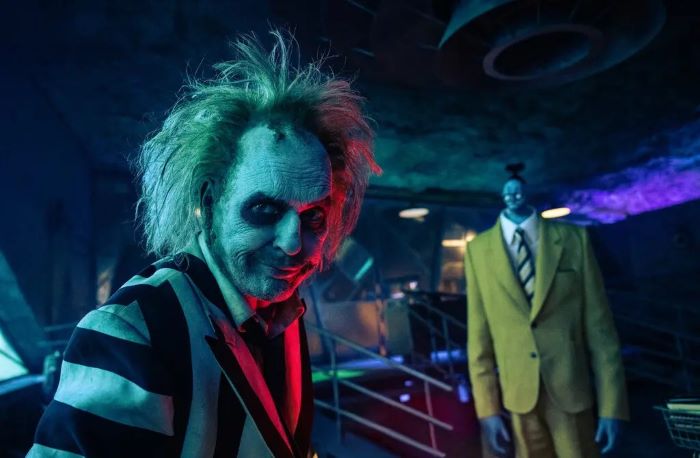

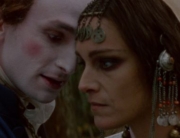
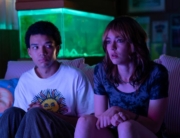
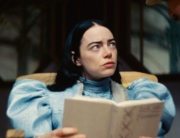
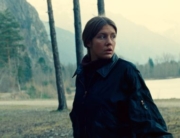










Leave A Comment